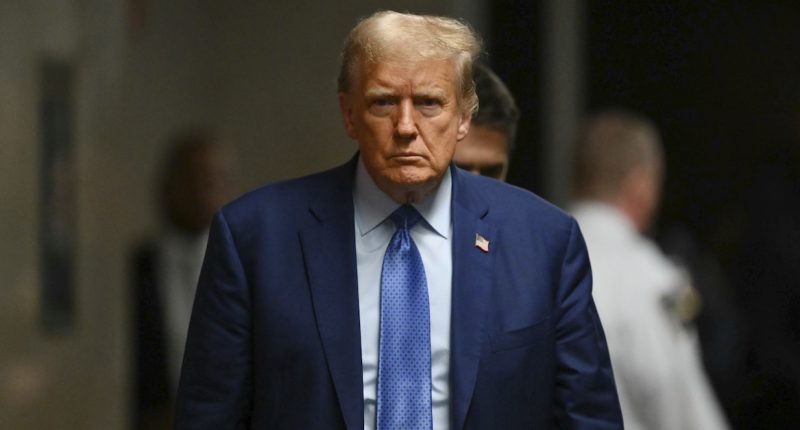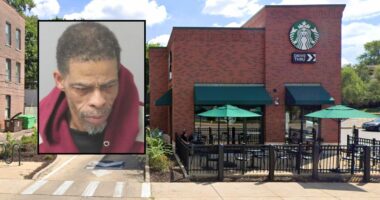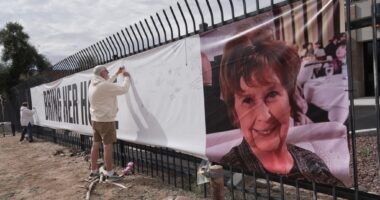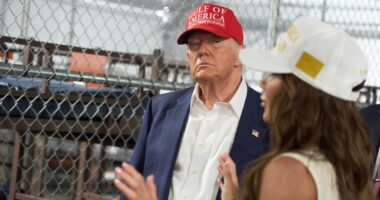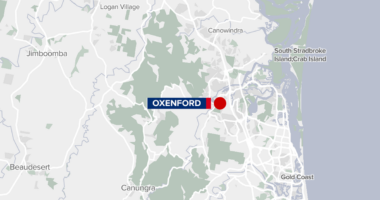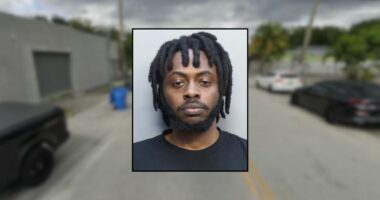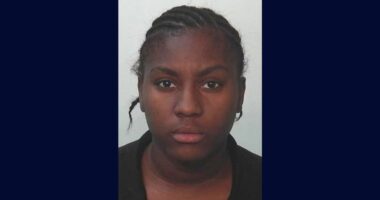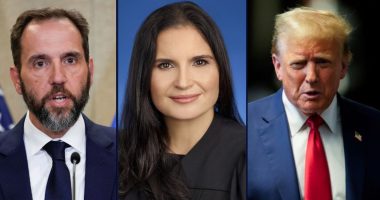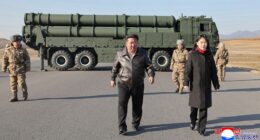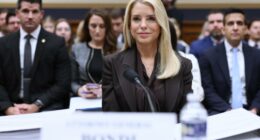Share this @internewscast.com
Then-candidate Donald Trump arrives at Manhattan Criminal Court in New York, on May 9, 2024 (Angela Weiss/Pool Photo via AP).
Not too long ago, before the 2024 election, Donald Trump was still a private citizen, working with his defense team to delay sentencing in his New York state felony hush-money case. Eventually, the sentencing resulted in an unconditional discharge. However, with Trump now back as president, his lawyers, alongside the U.S. Department of Justice, are seeking to transfer his ongoing appeal from state court to a federal court, citing his status as a federal officer.
The legal proceedings began at 10 a.m. on Wednesday before a panel from the 2nd U.S. Circuit Court of Appeals. The panel comprised three judges, all appointed by Democratic presidents: Judge Raymond Lohier and Senior Judge Susan Carney, both appointed by Barack Obama, and Myrna Perez, appointed by Joe Biden in 2021.
Throughout the session, the judges persistently questioned Trump’s lawyer, Jeffrey Wall, the former Acting Solicitor General, and Steven Wu, chief of appeals for the Manhattan DA’s office, about the appropriate jurisdiction for the case. Their inquiries hinted at their considerations regarding whether the president has “good cause” to request the case’s removal to federal court.
For Wall, the prosecution won the resulting 34 state felony convictions on the strength of a federal election law violation used as a predicate to a state crime — and by introducing the kinds of official acts evidence that the Supreme Court gutted in its immunity ruling in July 2024.
“A case like this is why removal exists in the first place,” Wall said.
Perez asked Wall if any court had allowed post-judgment removal of a criminal case, since the DA’s office emphasized in its brief that such removals had occurred but only in a civil context.
Wall argued that was a distinction without a difference under the relevant removal statute.
From here, Carney remarked that “it’s obviously quite anomalous” for a case to be removed at this stage, and she asked what would happen if the state appellate case does end up being removed to federal court.
“It’s a great question,” Wall replied, pressing the panel to reverse U.S. District Judge Alvin Hellerstein for abuse of discretion when he ruled in September that there was no “good cause” to file a second notice of removal.
Wall said the case is “a class of one, [and] it’s not like this happens often.”
It was a local DA’s prosecution of a president that makes the case truly “anomalous,” not Trump’s post-sentencing removal quest, Wall added.
Calling the use at trial of Trump tweets, a conversation with his attorney general, and testimony of former communications director Hope Hicks “structural error” on the part of the AG’s office, Wall reiterated that this was an “anomalous, one-of-its-kind prosecution.”
On “good cause,” Wall offered up a definition when Perez asked for one.
“Does the removing party have grounds that could not have reasonably been raised at an earlier time within the statutory default?” Wall said, again pointing to the blockbuster Supreme Court immunity ruling that followed the first failed removal effort.
“We made the arguments, it’s just that they were rejected by Judge Hellerstein” in the district court, he added, suggesting it was absurd for the DA’s office to blame the defense for unreasonable delay in the face of the Supreme Court’s weighty opinion.
“I sort of think we have good cause in spades,” Wall said.
Wu responded by hammering away at Trump’s defense for making a “deliberate choice” to wait for the state court to act on immunity implications before filing a “second and untimely notice of removal,” indicating that their own delays should not be rewarded with removal.
The DA’s attorney asserted that even if the case is technically removable, Trump still fails to establish “good cause” based on a two-month delay in filing.
“There was no barrier to proceeding,” Wu said.
Lohier next questioned Wu as to why the challenged evidence was relevant in the first place.
“Because the defendant was talking about the crime before he came into the White House,” Wu answered, saying that the evidence was about private, unofficial conduct.
Lohier did comment, however, that it was “interesting” the district judge “didn’t even allow a second removal notice.”
Wu steered the discussion back to the Trump team’s own deficiencies, saying it failed to “diligently” seek relief after the Supreme Court ruled.
“They had the opportunity and made the strategic decision not to?” Perez asked.
Wu replied that the defense had a choice that “they were fully aware of,” since they filed a notice of removal before, and they chose to go to state court first.
The defense did have the opportunity to raise questions of federal immunity and they didn’t, even though the “defendant knew what testimony might be coming in,” he continued, emphasizing that the use of a federal election law violation as a predicate to a state crime was part of the case from the start.
On rebuttal, Wall criticized the DA’s office for downplaying the importance of the official acts evidence and for accusing the defense of unreasonable delay.
Wall said the defense didn’t raise evidentiary immunity issues earlier because they couldn’t have anticipated what the Supreme Court would say in its immunity ruling.
“Everything about this cries out for federal court,” he said.
The panel then searched for answers as to how the case might go from here, if the court does rule in Trump’s favor. While the AG’s office envisioned a remand to Hellerstein’s court, Wall advocated for a more aggressive result.
While there would be “no legal impediment” to sending the removal case back to the district court, a more practical result would be the 2nd Circuit agreeing that there is “good cause for removal,” which would put the state appellate proceeding on hold.
Lohier remarked at the end that the case was “very well argued” by both sides.
In late May, both the DOJ and private attorneys for the president submitted briefs to make the case that Trump can remove the case to federal court even in the post-sentencing phase of the proceedings. They reasoned that the office of Manhattan DA Alvin Bragg, a Democrat, “improperly used” official acts evidence to “convict him of a state crime” and because certain defenses couldn’t be raised until after the U.S. Supreme Court’s immunity ruling, according to the DOJ.
“And the fact that it was not until after the conclusion of his state criminal trial that the Supreme Court issued its landmark decision defining the contours of presidential immunity — including a broad evidentiary immunity prohibiting prosecutors from inviting a jury to probe a President’s official acts, as President Trump’s removal notice alleges occurred here — supplies good cause for post-trial removal,” the filing said.
Trump’s attorneys, headlined by Wall, agreed that “decisions from other circuits unanimously support the availability of post-judgment removal under the federal-officer removal statute.”
The private lawyers also echoed the argument that Trump had “good cause” to invoke the removal statute, an argument that fell flat before Hellerstein.
“The submissions from the United States and DANY also confirm that President Trump had the necessary ‘good cause’ to file his removal notice after trial because he had no opportunity to raise either his Presidential immunity defense or his FECA preemption defense at any earlier time,” said the supplemental brief from the president’s team.
Earlier in May, the DA’s office took the position that removal is “no longer available” since Trump has already been sentenced, but even if it were available he shouldn’t get another bite at the apple.
“Even if removal were still formally available here, there were ample grounds supporting the district court’s finding of lack of good cause to permit defendant to file a second, untimely notice of removal,” the state filing said.
